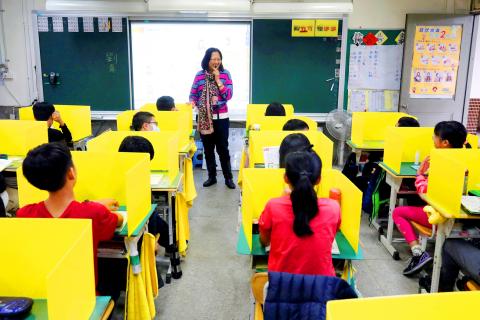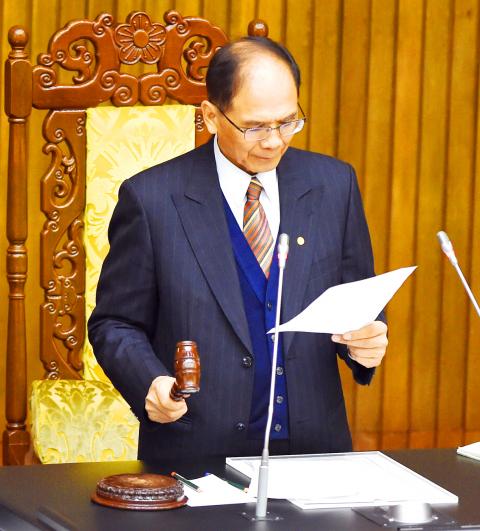Lawmakers yesterday approved a NT$60 billion (US$1.99 billion) special budget to fund disease prevention efforts, as well as bail out and support sectors affected by the COVID-19 pandemic.
The budget, planned according to the Special Act on COVID-19 Prevention, Relief and Recovery (嚴重特殊傳染性肺炎防治及紓困振興特別條例), was passed unanimously in its entirety just 16 days after it was unveiled.
The Legislative Yuan had earlier this month held three joint committee reviews, during which lawmakers agreed to leave the budget intact based on a consensus that disease prevention is the top priority.

Photo: Ann Wang, Reuters
The Ministry of Economic Affairs is to receive the lion’s share of the budget, NT$20.49 billion, which is to cover guarantees for small and medium-sized enterprises that need to take out loans, subsidized loans and coupons redeemable at stores, restaurants and beverage shops, traditional and night markets, and shopping districts.
It is also to use the funds to pay for the expropriation of mask production machinery and the development of new screening kits, support manufacturers developing new technologies and facilitate companies’ efforts to boost their exports.
The Ministry of Health and Welfare would receive NT$16.96 billion, which would go toward the research and development of drugs and vaccines targeting COVID-19; isolation and hospitalization of COVID-19 patients at designated facilities; compensation for medical personnel stationed at quarantine sites, quarantined people and those taking care of quarantined family members; and the procurement of kits, equipment and consumables to test for the novel coronavirus.

Photo: Chien Jung-fong, Taipei Times
The Ministry of Transportation and Communications is to receive NT$16.77 billion, which is to be used to bail out operators in the transportation and tourism industries that have been significantly affected by the pandemic, as well as to improve tourist destinations in preparation for plans to attract international tourists after the disease is under control.
The Council of Agriculture is to receive NT$3.56 billion to fund efforts to increase exports of produce, seafood and meat products, as well as to subsidize farmers and fishers.
The Ministry of Culture is to receive NT$800 million, which would be used to support cultural and arts venues, offer discounts when people shop at such venues and hold events to revitalize the arts and cultural sectors.
The budget is not bound by Articles 62 and 63 of the Budget Act (預算法), meaning that the funding can be transferred among agencies.
However, a resolution passed during cross-caucus negotiations on Thursday says that if an interdepartmental transfer of funds would exceed NT$50 million, the concerned agencies should first notify the legislature of the transfer.
Speaking after the passage of the budget, Democratic Progressive Party Legislator Chuang Jui-hsiung (莊瑞雄) thanked lawmakers across party lines for the swift review of the budget and the flexibility given to the agencies to use the funds.
He expressed gratitude to medical personnel who are on the front line in the fight against the virus, saying he hoped that the budget would lessen their burden as they safeguard public health.
Chinese Nationalist Party (KMT) Legislator Johnny Chiang (江啟臣) said that while not all agencies had rendered a report on the effects COVID-19 would have on the industries under their jurisdiction, lawmakers gave them the budgets that they had requested.

CROSS-STRAIT COLLABORATION: The new KMT chairwoman expressed interest in meeting the Chinese president from the start, but she’ll have to pay to get in Beijing allegedly agreed to let Chinese Nationalist Party (KMT) Chairwoman Cheng Li-wun (鄭麗文) meet with Chinese President Xi Jinping (習近平) around the Lunar New Year holiday next year on three conditions, including that the KMT block Taiwan’s arms purchases, a source said yesterday. Cheng has expressed interest in meeting Xi since she won the KMT’s chairmanship election in October. A source, speaking on condition of anonymity, said a consensus on a meeting was allegedly reached after two KMT vice chairmen visited China’s Taiwan Affairs Office Director Song Tao (宋濤) in China last month. Beijing allegedly gave the KMT three conditions it had to

STAYING ALERT: China this week deployed its largest maritime show of force to date in the region, prompting concern in Taipei and Tokyo, which Beijing has brushed off Deterring conflict over Taiwan is a priority, the White House said in its National Security Strategy published yesterday, which also called on Japan and South Korea to increase their defense spending to help protect the first island chain. Taiwan is strategically positioned between Northeast and Southeast Asia, and provides direct access to the second island chain, with one-third of global shipping passing through the South China Sea, the report said. Given the implications for the US economy, along with Taiwan’s dominance in semiconductors, “deterring a conflict over Taiwan, ideally by preserving military overmatch, is a priority,” it said. However, the strategy also reiterated

‘BALANCE OF POWER’: Hegseth said that the US did not want to ‘strangle’ China, but to ensure that none of Washington’s allies would be vulnerable to military aggression Washington has no intention of changing the “status quo” in the Taiwan Strait, US Secretary of Defense Pete Hegseth said on Saturday, adding that one of the US military’s main priorities is to deter China “through strength, not through confrontation.” Speaking at the annual Reagan National Defense Forum in Simi Valley, California, Hegseth outlined the US Department of Defense’s priorities under US President Donald Trump. “First, defending the US homeland and our hemisphere. Second, deterring China through strength, not confrontation. Third, increased burden sharing for us, allies and partners. And fourth, supercharging the US defense industrial base,” he said. US-China relations under

The Chien Feng IV (勁蜂, Mighty Hornet) loitering munition is on track to enter flight tests next month in connection with potential adoption by Taiwanese and US armed forces, a government source said yesterday. The kamikaze drone, which boasts a range of 1,000km, debuted at the Taipei Aerospace and Defense Technology Exhibition in September, the official said on condition of anonymity. The Chungshan Institute of Science and Technology and US-based Kratos Defense jointly developed the platform by leveraging the engine and airframe of the latter’s MQM-178 Firejet target drone, they said. The uncrewed aerial vehicle is designed to utilize an artificial intelligence computer